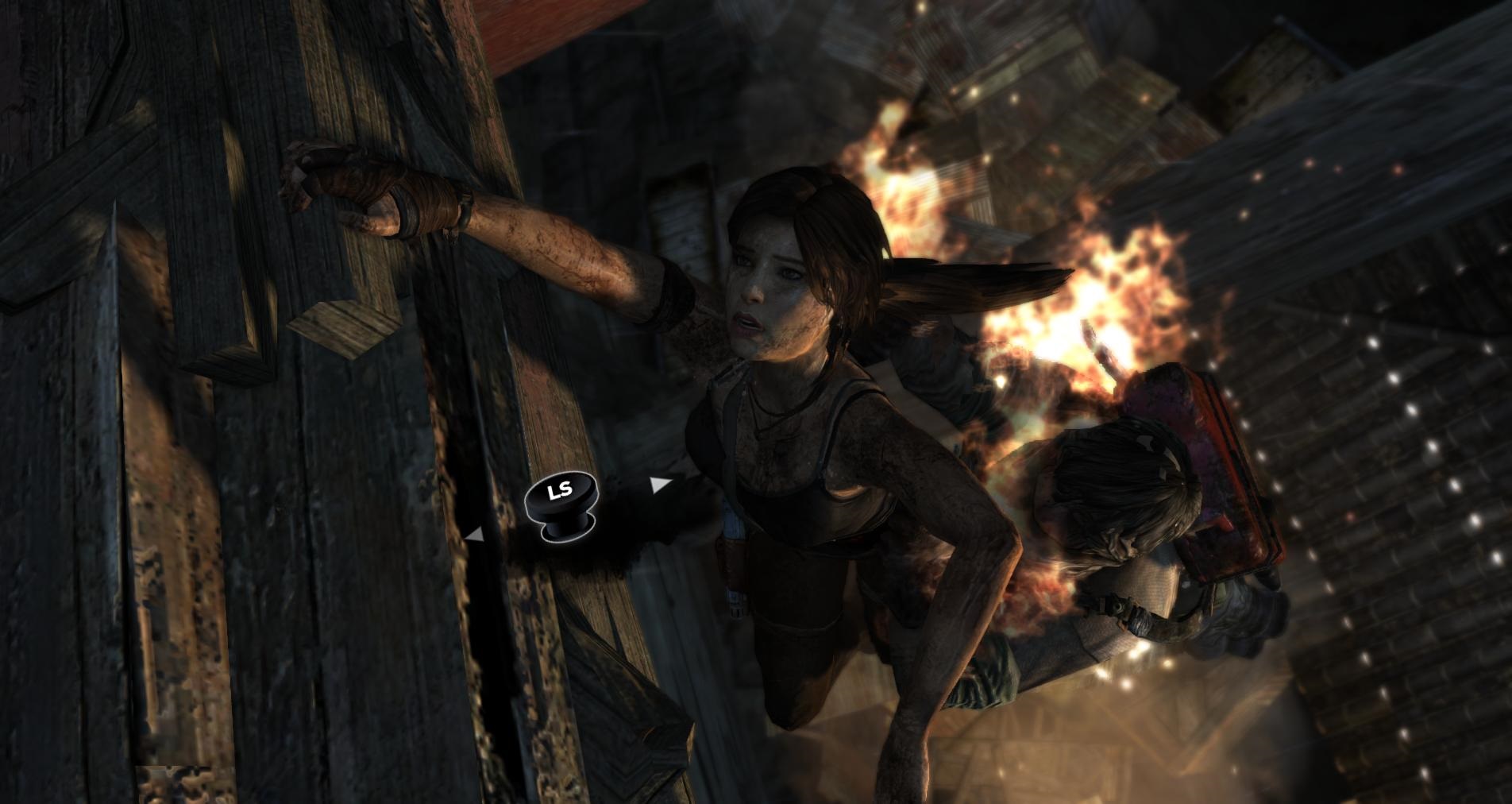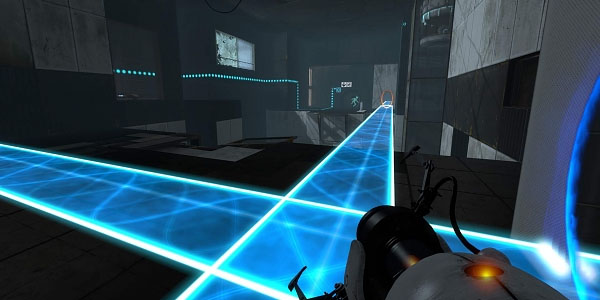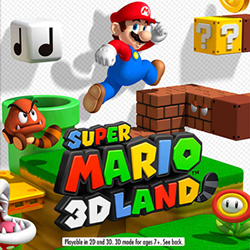The laugh track. The sound board. The wide-angle lens. As
media evolves, it develops new techniques. Either because of advances in
technology, or simply because an idea sees great success and becomes a trend. Video
games have seen plenty of its own techniques as the time has passed. One of the
more divisive techniques of the modern school of gaming is the quick time event.
For the uninitiated, a quick time event (QTE) is a
gameplay mechanic in which the game prompts the player to press a specific
button to achieve a certain goal. This is different from regular gameplay in
that these button-presses are context sensitive. Where the A button normally
makes you jump, in a QTE you'll be prompted to press the A button to have your
character jump out of the way of a falling rock. QTEs are characterized by
being reaction-based and generally trying to give a gameplay translation for a
character's instincts.
I can trace the evolution of the quick time event in
three landmark games. The first game is Shenmue, released for the Dreamcast in
1999. During the course of the game, main character Ryo Hazuki is put in
several situations where he must avoid something, catch something, or give
chase to someone. In particular, the chase scenes involved Ryo dodging obstacles
and choosing paths. For the cinematic effect, regular gameplay was probably not
intricate enough or too awkward. Thus, the scene was depicted as a cutscene
with quick time events as input. The scene changed depending on the player's
success with the quick time events. Shenmue implemented QTEs so effectively
that it put the concept on the map for future games to build on.
The Wii literally shook things up by incorporating motion controls.
The next game in my analysis is Resident Evil 4. Aside from forging new ground in third-person shooter games, I find this game incorporated quick time events not unlike Shenmue. In fact, Resident Evil 4 used them more frequently and in different ways. A cutscene would play for minutes, when all of a sudden the A button would appear onscreen. In the case of Resident Evil 4, failing a QTE would almost always result in a gruesome death for protagonist Leon Kennedy. Perhaps someday I'll revisit the concept of those death scenes in another post. QTEs also appeared in non-scripted situations, such as when an enemy grabbed Leon. This actually is a step up from a Resident Evil 3 mechanic which allowed the player to move in the opposite direction of an enemy and avoid damage. This is shown by having Jill Valentine execute a dodge ability.
The last game that I think leads up to quick time events
as they are today is Dead Space. Dead Space, or at least my interpretation of
it, is a game that aims to one-up everything about Resident Evil 4. The running
and gunning was smoother, the environments were much more immersive, and the
death scenes were even gorier. Once again, I'll come back to that sometime. And
yes, Dead Space incorporated quick time events in similar ways. In fact, Dead
Space took it a step further. Dead Space set up "scripted events"
which required QTEs and other context-sensitive actions to progress. For
instance, upon entering a certain corridor, the game is programmed to have a
large tentacle monster grab Isaac Clarke and drag him to a hole. The player had
to shoot the monster's weak point to save Isaac. However, the fixed camera made
this difficult.
So what am I getting at here? Games like Dead Space, Resident
Evil 4, and Shenmue have a sort of "pace" to playing them. Quick time
and scripted events are part of the experience and the brand of these games. There
are normalcy and consistency in these mechanics. Well, I've had an experience
that told me there's more to this.
Failure scenes have become a separate art form. The new Tomb Raider sure has its share.
We've all had that one dream where something is attacking
us and we can't do anything because it's a dream. In my case, I've dreamt that
there's literally a snake in the grass in the front yard outside my house. I
step into the grass, because it's a dream, the snake prowls around, lunges for
me, end dream. I'm not particularly afraid of snakes, I guess I had recently
watched or played something with snakes.
Then, one night, my dream changed. Same set-up, but this
time when the snake lunged, time seemed to slow down and I saw a prompt for a
dodge. The dream followed the prompt and allowed the snake to fall past me. The
dream then prompted me to move in for a counter strike. I did, and, well, I
can't really pull much more of the dream past that. Either way, waking up from
that dream gave a very interesting feeling. My go-to dream for helplessness was
completely turned around to be empowering. Because of video games? Because of
quick time events?
Like I said before, quick time events are a
reaction-based mechanic. They test your reflexes and hand-eye coordination by
telling you a button to press and giving you little time to do so. Gamers
typically have better association of buttons with functions than they do the
labels of the buttons to their positions. I also mentioned how QTEs can be a
gameplay translation of instinct. Instinct, which I define in simple terms as
"being yourself quickly." That is, react as you would without taking
time to revise in your head. It's empowering to know what to do and when. It
helps you reaffirm your identity and proudly own it.
Heavy Rain, a
PlayStation 3 title, was really ambitious with quick time events.
Video games always depict characters using instinct to
save themselves or others from peril. In real life, ideally, peril is not
ever-present. However, the opportunity to use our instincts is. For instance,
I'm sure at some point in your life someone has approached you and said
"hello." What did you do in return? Look at them and stare blankly
while you decided between "hi," "hello," "good
morning," or just a nod? Probably not. You picked a response and had a
conversation. Your brain went through a little quick time event. Sure, nothing
was at stake. Life would go on if you had said "apple," but all the
same you were prompted and your instinct to greet the person back kicked in.
Saying "hello" isn't exactly the most intense
example, but it is a relatable one. Real-life quick time events happen all the
time. Some of them occurring in the form of decisions. Ever catch a ball that
was flying straight toward you? Good job on that quick time event! Job seekers,
have you ever seen a posting on craigslist that you qualify for but said
"nah?" That was a quick time event that you willingly didn't respond
to. The only difference is you won't come back to that moment to "get it
right." This isn't guilt, just fact.
The fact that video game characters can respond to
situations so quickly and expertly is why we see them as being strong. They
don't second-guess what they're capable of, they just do what they can - or
must. We too can be just like them. Sure, we won't be hitting any emergency
brakes nor making jumps to safety, but we will be accomplishing commonplace
feats that make us great people in our own home. Helping someone grab the milk
on the high shelf, taking out the garbage, speaking up to volunteer, speaking
up to not go through with something that you're being pressured into. All of
these things which you may brush off or not feel "strong" enough to
accomplish are more possible than you can imagine. It's not as simple as
pushing a button, but it takes just as much effort when you set your mind to
it.
Give it a try. See if, in your regular day, you can
recognize a quick time event and do what you imagine it's prompting you to do.
If you have any relatable experiences with real-life quick time events that you
want to share, please post in any of the linked social media. I look forward to
seeing responses. Until then, game out.
P.S.
I make quick time events out to be very promising, but in
execution they actually have somewhat of a poor track record in gamer culture.
See below for a humorous take.







